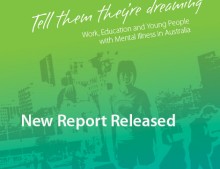
Orygen Youth Health Research Centre has just released a landmark report examining a number of the barriers to the participation in employment and education of young people with mental illness in Australia.
The report, Tell Them They’re Dreaming: Work, Education and Young People with Mental Illness in Australia, suggests that despite the vast majority of young people with mental illness wanting to work, there is a growing body of evidence that indicates they are being let down by current policy settings.
This report has been produced by a team of experts at OYHRC, led by Associate Professor Eóin Killackey, to explore and identify issues associated with employment marginalisation among young Australians with an experience of mental illness.
Conducted in February and March 2014, the report examines labour market outcomes, educational attainment, employment services for job seekers and the barriers facing young people with mental illness looking for work. The report looks at the effects of employment as a recovery tool and suggests evidence-based models to improve rates of employment among young people with mental illness.
Key recommendations are to help young Australians with mental illness realise their employment and educational dreams.
- Fund high fidelity individual placement support employment and education services to be provided to young people presenting to headspace centres around Australia. These services would be fully embedded and come under the governance of headspace. This could be funded from a range of current funding sources.
- Expand individual placement support services into mainstream community mental health services for all mental health consumers who wish to work or return to study.
- Develop anti-stigma campaigns targeting employers, families, young people and primary care providers to break down attitudes that imply that young people with mental illness cannot or should not work.
- Educate mental health clinicians about the importance of employment and education as a part of, not the product of, recovery. Such a program to be led by the recently announced National Centre of Excellence in Youth Mental Health.
- Through the provision of comprehensive early intervention services that address both symptomatic and functional needs, provide a viable pathway to return to employment and education and avoid commencement on the Disability Support Pension.
Further information
- Watch the video: Assoc. Professor Eoin Killackey explains the report findings in more detail
- Download the report (PDF): Tell Them They’re Dreaming: Work, Education and Young People with Mental Illness in Australia
- More information about the report from Orygen Youth Health Research Centre
